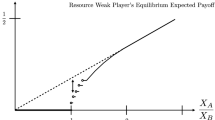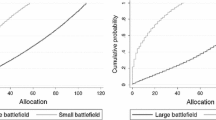Abstract
In the Colonel Blotto game, two players simultaneously distribute forces across n battlefields. Within each battlefield, the player that allocates the higher level of force wins. The payoff of the game is the proportion of wins on the individual battlefields. An equilibrium of the Colonel Blotto game is a pair of n-variate distributions. This paper characterizes the unique equilibrium payoffs for all (symmetric and asymmetric) configurations of the players’ aggregate levels of force, characterizes the complete set of equilibrium univariate marginal distributions for most of these configurations, and constructs entirely new and novel equilibrium n-variate distributions.
Similar content being viewed by others
References
Baye M.R., Kovenock D., de Vries C.G. (1996). The all-pay auction with complete information. Econ Theory 8:291–305
Bellman R. (1969). On Colonel Blotto and analogous games. Siam Rev 11:66–68
Blackett D.W. (1954). Some Blotto games. Nav Res Log Quart 1:55–60
Blackett D.W. (1958). Pure strategy solutions to Blotto games. Nav Res Log Quart 5:107–109
Borel, E.: La théorie du jeu les équations intégrales à noyau symétrique. Comptes Rendus de l’Académie 173, 1304–1308 (1921); English translation by Savage, L.: The theory of play and integral equations with skew symmetric kernels. Econometrica 21, 97–100 (1953)
Borel, E., Ville, J.: Application de la théorie des probabilitiés aux jeux de hasard. Paris: Gauthier-Villars 1938; reprinted in Borel E., Chéron, A.: Théorie mathematique du bridge à la portée de tous. Paris: Editions Jacques Gabay 1991
Che Y.K., Gale I.L. (1998). Caps on political lobbying. Am Econ Rev 88:643–651
Gross O., Wagner R. (1950). A continuous Colonel Blotto game. RAND Corporation RM-408
Hillman A.L., Riley J.G. (1989). Politically contestable rents and transfers. Econ Polit 1:17–39
Kvasov D. (2005). Contests with limited resources. University of Auckland, mimeo
Laslier J.F. (2002). How two-party competition treats minorities. Rev Econ Des 7:297–307
Laslier J.F., Picard N. (2002). Distributive politics and electoral competition. J Econ Theory 103:106–130
Myerson R.B. (1993). Incentives to cultivate minorities under alternative electoral systems. Am Polit Sci Rev 87:856–869
Nelson R.B. (1999). An introduction to copulas. Springer, Berlin Heidelberg New York
Sahuguet N., Persico N. (2006). Campaign spending regulation in a model of redistributive politics. Econ Theory 28:95–124
Schweizer B., Sklar A. (1983). Probabilistic metric spaces. North-Holland, New York
Shubik M., Weber R.J. (1981). Systems defense games: Colonel Blotto, command and control. Nav Res Log Quart 28:281–287
Sklar A. (1959). Fonctions de répartition à n dimensions et leurs marges. Publications de l’Institut de Statistique de l’Université de Paris 8:229–231
Tukey J.W. (1949). A problem of strategy. Econometrica 17:73
Weinstein J. (2005). Two notes on the Blotto game. Northwestern University, mimeo
Author information
Authors and Affiliations
Corresponding author
Additional information
I am grateful to Jason Abrevaya, Dan Kovenock, James C. Moore, Roger B. Nelsen, and three anonymous referees for very helpful comments. A version of this paper was presented at the 2005 Midwest Economic Theory Meetings. This paper is based on the first chapter of my Ph.D. dissertation
Rights and permissions
About this article
Cite this article
Roberson, B. The Colonel Blotto game. Economic Theory 29, 1–24 (2006). https://doi.org/10.1007/s00199-005-0071-5
Received:
Accepted:
Published:
Issue Date:
DOI: https://doi.org/10.1007/s00199-005-0071-5




